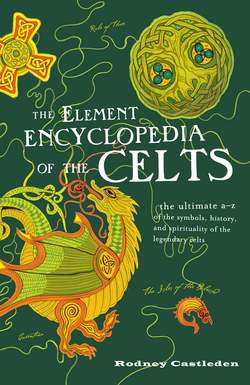Читать книгу The Element Encyclopedia of the Celts - Rodney Castleden - Страница 39
THE LAST BATTLE
ОглавлениеThe site of the last battle, Camlann, has been discussed endlessly. Every author who has written about Arthur has their own favored site. I have discussed elsewhere the reasons for thinking that the likeliest place is Pont ar Gamlan: a boulder-strewn fording-place at the confluence of the Eden and Mawddach rivers a few miles north of Dolgellau in North Wales. A third river, the Gamlan, flows down the steep mountainside from the west to join the Mawddach close by. It flows down through an oak forest and over some impressive waterfalls: the Black Falls, just above Ganllwyd. The name “Gamlan” is very close to the traditional name of the last battle, and in Welsh a cadgamlan is an utter rout, a complete massacre, and this is likely to be the original meaning of the battle’s name, now commemorated in the name of the river.
This may seem an odd place for Arthur to be fighting a battle in that the threat from the Saxons was from the east. But the various traditions about the last battle have in common the idea that it was a fight amongst the British. Arthur was betrayed by a relative, perhaps a nephew, called Modred or Medraut. With that in mind, the final battle might have been fought well inside the frontiers of Britannia Prima, in Devon, Cornwall, or anywhere in Wales.
The North Wales location suggests that Arthur was making his way north into the kingdom of Gwynedd along the major south–north Roman road known as Sarn Helen. The King of Gwynedd was Maelgwn, and his fortress was Castell Degannwy, perched on a rocky, twin-peaked hilltop overlooking the Conwy estuary. Like many other Dark Age strongholds, this was a refortified Iron Age fort. The site has yielded sixth-century pottery and there is a tradition that it was the seat of Maelgwn, though, like Arthur, Maelgwn had a less conspicuous refuge residence, at Aberffraw on the west coast of Anglesey. Degannwy was Maelgwn’s frontline fortress, and this was where Arthur was heading. The last battle took place in an atmosphere of distrust and civil war, and Arthur was probably hoping to deal with Maelgwn’s disloyalty.
Maelgwn had a reputation for ruthlessness. We know from the outright condemnation of him by Gildas that he murdered his own uncle in order to become King of Gwynedd; now he was envious of Arthur’s High Kingship and determined to get it for himself. Maelgwn was Arthur’s enemy; the king who was destabilizing the British confederation and who wanted him dead so that he could be dux bellorum himself.
Whether Arthur and his war-band rode into Gwynedd to quell an overt rebellion and open and anticipated hostility or were lured there by some guile of Maelgwn’s and fell unsuspecting into a trap at Ganllwyd cannot be determined from the existing evidence. Certainly the site, confined by steep valley sides and dense forests, is ideal for an ambush.
Two things are known for certain: Maelgwn did gain the High Kingship shortly after the Battle of Camlann and Arthur’s disappearance—in 546, according to one version—and gained it by deception. There is also the tradition that Arthur was in the end the victim of treachery at Camlann: perhaps the treachery was Maelgwn’s, not Modred’s. And just possibly Arthur was the murdered “uncle” mentioned by Gildas.
If Maelgwn was indeed responsible for the death of Arthur and for bringing the Arthurian peace to an end, Gildas’s extraordinary hatred and condemnation of Maelgwn’s many-sided wickedness becomes understandable. Arthur was behind the golden years of relative stability and justice between the Battles of Badon and Camlann, and those years came to an end with his final defeat. Gildas mentions specifically that Maelgwn removed and killed many tyrants (meaning kings, not necessarily tyrants in the modern sense), that Maelgwn was “last in my list but first in evil,” and that Maegwn “cruelly despatched the king your uncle.” Here, too, is the uncle-slaying regicide motif that would later be attributed, by Geoffrey of Monmouth, and possibly mistakenly, to Modred.
